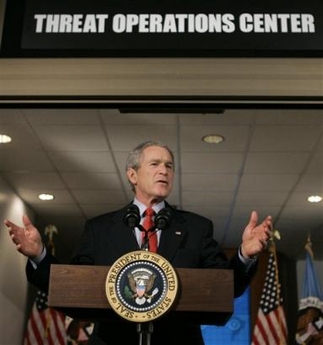|
Bush: Bin Laden should be taken seriously
(AP)
Updated: 2006-01-26 09:24
US President Bush, defending the government's secret surveillance program,
said Wednesday that Americans should take Osama bin Laden seriously when he says
he's going to attack again.
"When he says he's going to hurt the American people again, or try to, he
means it," Bush told reporters after visiting the top-secret National Security
Agency where the surveillance program is based. "I take it seriously, and the
people of NSA take it seriously."
It was Bush's first comment about bin Laden since the al-Qaida leader warned
in a tape aired last week that his fighters are preparing new attacks in the
United States. Bin Laden offered a truce, without specifying the conditions, and
the White House responded that the United States would never negotiate with the
mastermind of the Sept. 11 attacks.
Bush's NSA visit was part of an aggressive administration effort to defend
the surveillance program. Experts and lawmakers from both parties have
questioned whether it's legal for the government to listen to conversations in
the United States without a warrant, which the administration could get through
the Foreign Intelligence Surveillance Court.

US President Bush gestures during a statement
at the National Security Agency on Wednesday, Jan. 25, 2006, in Fort
Meade, Md.[AP] | Four leading Democratic senators wrote Bush Wednesday saying they support
efforts to do everything possible within the law to combat terrorism, but that
the NSA program is an "apparent violation of federal law."
"If you or officials in your administration believe that FISA, or any law,
does not give you enough authority to combat terrorism, you should propose
changes in the law to Congress," wrote Sens. Harry Reid, Edward Kennedy, Richard
Durbin and Russ Feingold. "You may not simply disregard the law."
Reporters traveling with the president were only allowed to see a few minutes
of Bush's NSA tour, as he walked through the high-tech Threat Operations Center
where intelligence experts monitor Internet traffic. He spoke to reporters from
a podium set up in a hallway after completing his tour, but did not take
questions.
In keeping with the NSA's secrecy, reporters were required to leave their
cell phones, pagers, laptops and wireless e-mail devices outside the complex.
The White House negotiated so that the journalists could bring in cameras and
video equipment, but they were allowed only to take photos of the president, not
the inside or outside of the facility itself.
Bush said the NSA program is limited to communications between the United
States and people overseas who are linked to al-Qaida. He said it has helped
prevent terrorist attacks and save American lives, although the government has
not given any specifics.
Bush urged that people "listen to the words of Osama bin Laden and take him
seriously."
His critics say the law requires him to get permission from the Foreign
Intelligence Surveillance Court to eavesdrop on communications involving
Americans.
"Obviously, I support tracking down terrorists," Sen. Hillary Rodham Clinton,
D-N.Y., said in a speech Wednesday. "I think that's our obligation. But I think
it can be done in a lawful way."
Sen. Patrick Leahy said the administration should have asked Congress to
change the law if it wanted additional surveillance powers.
"Instead, a top lawyer in the Bush administration did just the opposite,"
Leahy said Wednesday, circulating 2002 testimony from a Justice Department
official who said the administration had no position on a bill that would have
made it easier to get warrants from the FISA court.
Bush said he had the legal right to do whatever he could to prevent further
attacks and that the NSA program "is fully consistent with our nation's laws and
Constitution."
"I'll continue to reauthorize this program for so long as our country faces a
continuing threat from al-Qaida and related groups," Bush said.
Sen. John McCain said he's eager to learn more. Asked on NBC's "Today" show,
if Bush broke the law, McCain replied: "I don't know. I want to be perfectly
clear. I don't know the answer."
|